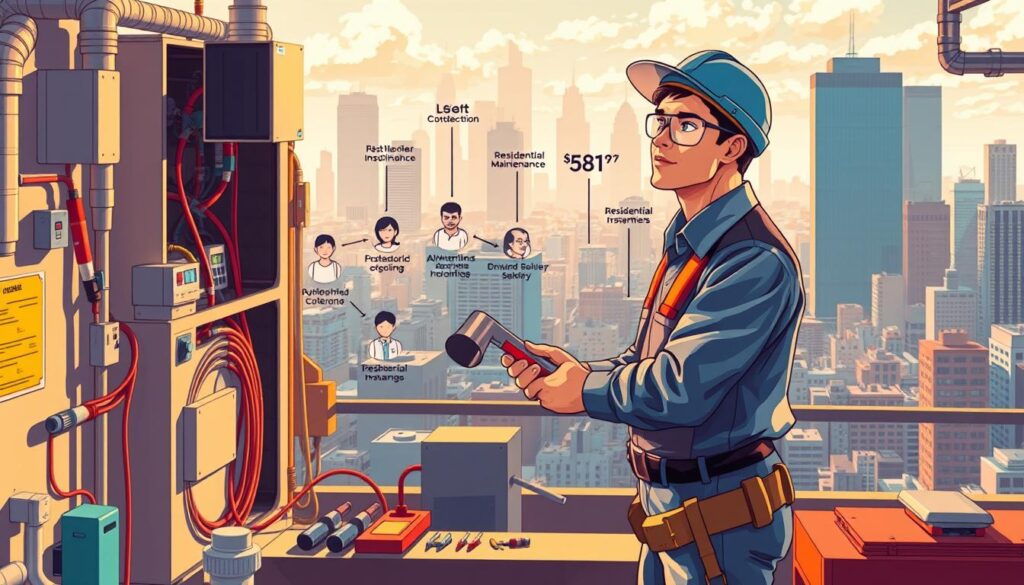Affiliate Disclosure
HVAC Guide Guys is a participant in the Amazon Services LLC Associates Program, an affiliate advertising program designed to provide a means for sites to earn advertising fees by advertising and linking to Amazon.
How Much Do HVAC Technicians Make? HVAC technicians are key to keeping places comfortable and safe. If you’re thinking about a career, knowing the salary can help a lot.

Ever wondered how much HVAC technicians make? The field of heating, ventilation, and air conditioning offers great financial rewards. Many people don’t realize this.
This guide will cover everything about HVAC technician salaries. You’ll learn about starting salaries and career paths. It’s great for those considering this job or wanting to know their worth.
Key Takeaways
- HVAC technicians enjoy competitive salaries across various experience levels
- Earnings increase with specialized certifications and skills
- Where you live greatly affects HVAC technician pay
- There are many chances to grow in this important field
- Getting more training and learning new things can raise your pay
Table of Contents
Understanding the HVAC Technician Role
HVAC technicians are key to keeping indoor spaces comfy in homes and businesses. They manage systems that control heating, cooling, and air flow. This job affects their hourly rate and starting salary.
This career needs technical smarts, problem-solving skills, and physical strength. HVAC techs work in many places, from small crawl spaces to big rooftops.
Key Responsibilities and Skills Required
HVAC pros do many important tasks:
- Installing new heating and cooling systems
- Conducting routine maintenance inspections
- Diagnosing mechanical and electrical failures
- Performing complex system repairs
- Reading and interpreting technical diagrams
Essential Technical and Soft Skills
To succeed, you need technical skills and personal traits:
- Strong mechanical aptitude
- Excellent problem-solving capabilities
- Physical stamina and strength
- Customer service communication skills
- Attention to detail
Educational Requirements and Licensing
To be an HVAC tech, you’ll need:
- High school diploma or equivalent
- Technical training program (6-24 months)
- State-specific professional certification
- EPA refrigerant handling certification
Industry Job Outlook
The HVAC field is growing fast, with more jobs than in many other trades. Your starting salary can rise with experience and extra certifications. It’s a great career for those who like technical work.
National Average HVAC Technician Salary
Understanding the average hvac tech income is key to planning your career in the heating, ventilation, and air conditioning field. The national picture for hvac technician pay shows a bright financial future for those with the right skills.
In the United States, HVAC technicians’ pay varies based on several factors. Their average yearly salary falls between $50,000 and $75,000. This range changes a lot based on experience, where you work, and your area of expertise.
- Entry-level technicians start around $35,000 per year
- Mid-career professionals earn about $55,000 to $65,000
- Experienced senior technicians can make $80,000 or more
Your earnings can really go up with more certifications and special skills. Cities and places with very hot or cold weather often pay HVAC workers more.
“The HVAC industry offers stable and competitive compensation for skilled technicians willing to invest in their professional development.” – Industry Expert
As you get better at your job, your pay will increase. This happens when you get more training and learn about specific types of HVAC systems.
Explore Our HVAC Shop
Looking for top-rated HVAC tools, parts, and accessories? Visit our shop and find the perfect solution for your needs.
Visit the ShopHow Much Do HVAC Technicians Make: Complete Breakdown
Understanding the hvac pay scale is key to planning your HVAC career. Your earnings grow as you gain experience and skills.
The HVAC field offers great financial rewards for those who invest in their skills. Let’s look at how salaries change as you progress in your career.
Entry-Level Salaries
At the start, HVAC technicians earn around $35,000 to $45,000 a year. Your salary depends on several things:
- Educational background
- Certification level
- Geographic location
- Initial technical skills
Mid-Career Earnings
With 3-7 years of experience, your salary goes up. Mid-career technicians can earn $50,000 to $70,000.
| Experience Level | Typical Salary Range | Potential Factors |
|---|---|---|
| 3-5 Years | $50,000 – $60,000 | Additional certifications |
| 5-7 Years | $60,000 – $70,000 | Specialized skills |
Senior Level Compensation
Experienced HVAC technicians can earn a lot. Those with 10+ years of experience can make $75,000 to $100,000.
“Your expertise becomes your most valuable asset in the HVAC industry.” – HVAC Career Insights
Senior technicians can increase their earnings by:
- Getting advanced certifications
- Developing specialized technical knowledge
- Taking on leadership roles
- Getting into management
Regional Salary Variations Across the United States
Your salary as an HVAC technician can change a lot based on where you work in the United States. Different places have their own pay scales. This can really affect how much you earn.
Some states pay HVAC technicians more than others. This is because of things like the local economy and weather. Places with really hot or cold weather, like Alaska, Texas, and Florida, often pay more. This is because people there need more heating and cooling.
- Northeastern states like Massachusetts and New York usually pay well.
- Western states, like California and Washington, offer good pay too.
- Southern states, such as Georgia and North Carolina, see HVAC technician wages grow.
Big cities usually pay more than small towns. Places like New York City, San Francisco, and Chicago have higher salaries. This is because they have more buildings and higher costs of living.
Things that affect how much you get paid in different places include:
- The cost of living in each state
- The local economy
- How crowded the area is
- How much industry and business there is
When planning your career, think about these differences. It can help you make more money in the HVAC field.
Factors Affecting HVAC Technician Pay
Knowing what affects hvac technician pay can help you move up in your career. Your salary isn’t just about how much you get paid per hour. It’s influenced by many factors.
Experience and Certification Impact
HVAC certification can really increase your earnings. It shows you have advanced skills and are serious about your work. Technicians who get certified often see a big jump in their pay.
- Getting certified at the start can raise your starting pay by 10-15%
- More advanced certifications can increase your earnings by up to 25%
- Showing you keep learning shows employers you’re committed
Specialization and Industry Dynamics
The type of work you do greatly affects your pay. Different areas of the industry offer different pay based on how complex and in demand they are.
- Commercial HVAC systems: More complex, higher pay
- Green technology specializations: Growing market with higher pay
- Industrial refrigeration: Specialized work with high earning possibilities
Company Size and Geographic Location
Where you work is as important as what you do. Big cities and well-known companies usually pay more. But, working in rural areas might mean lower pay, but also unique chances for skilled workers.
Planning your career well means understanding these pay factors and aiming for success.
Types of HVAC Technician Positions and Their Salaries

The HVAC industry has many career paths with different salaries. Knowing the various HVAC technician roles can help you choose the right path. This way, you can increase your chances of earning a good hvac technician salary.
Here are the main HVAC technician positions you might consider:
- Residential HVAC Technicians: Work in homes, installing and maintaining heating and cooling systems. Average salaries range from $45,000 to $65,000 annually.
- Commercial HVAC Specialists: Focus on larger buildings like offices and hospitals. These professionals often earn between $55,000 and $80,000 per year, making them among the highest paying hvac jobs.
- Industrial HVAC Technicians: Handle complex systems in manufacturing and industrial settings. Their specialized skills can command salaries from $60,000 to $90,000.
- HVAC System Designers: Create technical designs and plans for advanced climate control systems. These professionals typically earn $70,000 to $100,000 annually.
Your salary depends on experience, location, and specialized skills. Getting advanced certifications and focusing on in-demand areas can greatly increase your hvac technician salary.
“Specialization is key to unlocking higher earnings in the HVAC industry.” – HVAC Career Experts
Each position needs unique skills and offers different career growth chances. By understanding these roles, you can plan your HVAC career path to increase your earnings.
Explore Our HVAC Shop
Looking for top-rated HVAC tools, parts, and accessories? Visit our shop and find the perfect solution for your needs.
Visit the ShopBenefits and Additional Compensation
HVAC technician pay is more than just a salary. Knowing all the benefits helps you see the job’s true value in the HVAC field.
Healthcare and Insurance Options
Many jobs offer great health insurance. This can really improve your hvac pay scale. You might get:
- Medical insurance
- Dental coverage
- Vision care plans
- Disability insurance
“A robust benefits package can add substantial value to your overall compensation,” says industry expert Mark Reynolds.
Retirement Plans and Bonuses
Retirement plans and bonuses are key parts of HVAC pay. Most jobs include:
- 401(k) retirement plans
- Employer matching contributions
- Annual performance bonuses
- Profit-sharing programs
Additional Perks and Incentives
Some HVAC jobs offer extra perks. These can increase your total pay:
- Paid time off
- Vehicle allowances
- Tool reimbursement
- Continuing education support
Remember, a good benefits package can greatly improve your job satisfaction and financial future.
Career Growth and Salary Advancement Opportunities
Being an HVAC technician opens doors to exciting career growth and higher earnings. The salary for HVAC technicians changes over time. This change offers many ways to increase your income.
As you gain experience, your earnings can grow a lot. Here are some promising ways to advance your career:
- Supervisory and Management Positions
- Team Lead Roles
- Operations Manager
- Department Supervisor
- Specialized Technical Tracks
- Energy Efficiency Consultant
- Industrial HVAC Specialist
- Advanced Refrigeration Expert
- Entrepreneurial Opportunities
- Independent Contractor
- HVAC Business Owner
- Consulting Services
Every path has its own way to boost your earnings. Getting more certifications, learning new skills, and gaining experience can make your HVAC career very rewarding.
Pro Tip: Always keep learning and stay current with HVAC tech. This will make you more valuable and increase your salary.
“The HVAC industry rewards those who invest in their professional growth and skill development.” – Industry Expert
Highest Paying HVAC Specializations

Exploring the highest paying HVAC jobs reveals some top specializations. These areas can greatly boost your hvac technician salary. Developing expertise in these niches is key.
Here are the top HVAC specializations for high earnings:
- Commercial HVAC Systems: These complex installations need advanced skills and higher salaries
- Industrial Refrigeration Specialists: They require knowledge of large-scale cooling systems
- Energy Management Technicians: They optimize building energy efficiency
- HVAC Controls and Automation Experts: They are skilled in cutting-edge technological systems
Professionals in these fields can earn 20-30% more than regular HVAC technicians. To increase your salary, focus on advanced technical skills and get more certifications.
Your earning power grows with:
- Advanced technical training
- Industry-specific certifications
- Specialization in high-demand technological areas
- Continuous professional development
Choosing a high-demand HVAC specialization can change your career path. It opens up big financial opportunities in this fast-paced industry.
Education and Certification Impact on Earnings
Starting your HVAC career can be greatly improved by education and certification. Professional development is more than just learning. It’s about increasing your salary and opening doors to better pay.
Certifications are key to moving up in the HVAC field. They show your skills and knowledge. This can lead to higher pay and more career opportunities.
Essential Certifications for Career Growth
- EPA 608 Certification: Required for handling refrigerants
- NATE (North American Technician Excellence) Certification
- HVAC/R Technical Certification
- RSES (Refrigeration Service Engineers Society) Credentials
Advanced Training Benefits
Getting advanced certifications can bring big financial gains. Specialized training often leads to higher salaries. It can change your career path for the better.
“Continuous learning is the minimum requirement for success in any field.” – Brian Tracy
Continuing Education Value
Keeping up with new HVAC tech makes you more valuable. Employers pay more for those who keep learning. This can lead to better jobs and higher pay.
Investing in certifications and education can take your HVAC career to new heights. Your dedication to learning can really pay off.
Explore Our HVAC Shop
Looking for top-rated HVAC tools, parts, and accessories? Visit our shop and find the perfect solution for your needs.
Visit the ShopCommercial vs. Residential HVAC Salary Comparison
Looking into hvac technician salaries, you’ll see big differences between commercial and residential jobs. HVAC offers different pay based on your area of focus.
Commercial HVAC techs usually earn more than those in residential settings. This pay gap comes from several key reasons:
- Complexity of commercial heating and cooling systems
- Scale of industrial and commercial projects
- Advanced technical skills required
- Longer project durations
The salary scene shows some interesting facts:
- Commercial HVAC technicians: Average annual salary around $69,908
- Residential HVAC technicians: Average annual salary approximately $62,033
Your career path greatly affects your earnings. Commercial HVAC requires more specialized knowledge of complex systems in:
- Large office buildings
- Industrial facilities
- Hospitals and healthcare centers
- Manufacturing plants
Residential techs work mainly in homes and smaller places. They need less specialized knowledge. This is why there’s a pay difference between commercial and residential HVAC pros.
Professional tip: Invest in advanced certifications to boost your earning in either sector.
Your choice between commercial and residential HVAC jobs can shape your financial future. Think about your skills, interests, and long-term goals when deciding.
Conclusion
Exploring an HVAC technician career shows promising earnings. The amount you make depends on experience, specialization, and where you work. The HVAC pay scale is competitive, from entry-level to senior roles.
Investing in education and getting advanced certifications can boost your career. Specializing in commercial or residential systems increases your value. The HVAC industry offers great growth and financial opportunities.
Planning your career is key to earning more. Knowing salary differences by region and focusing on in-demand areas helps. Staying skilled keeps you competitive in the HVAC sector.
An HVAC technician career is more than a job. It’s a chance for a rewarding and stable career. With dedication and learning, you can achieve success in this vital field.

